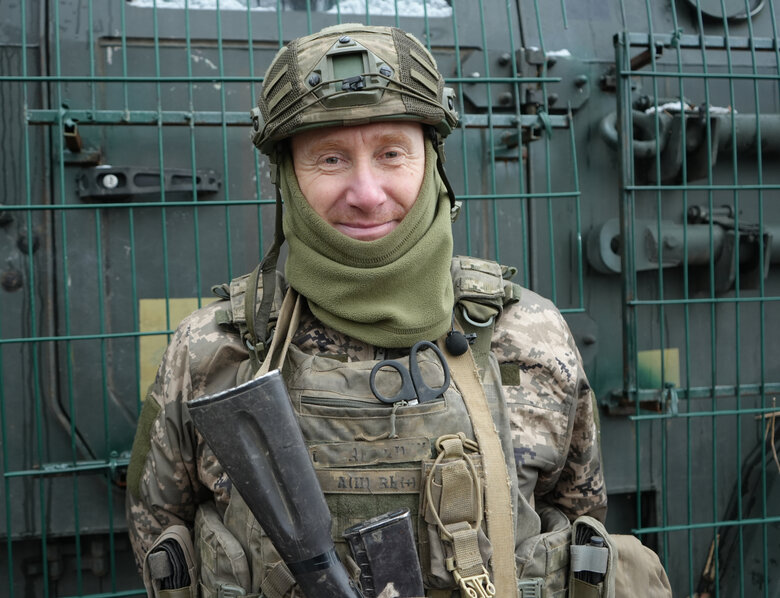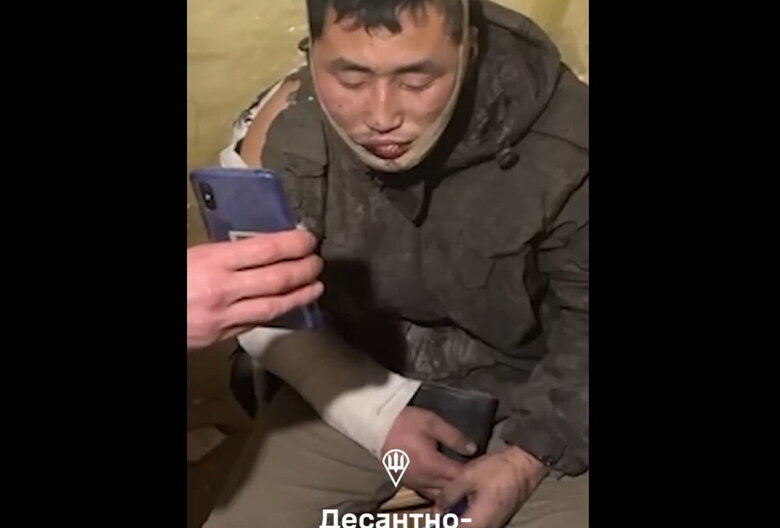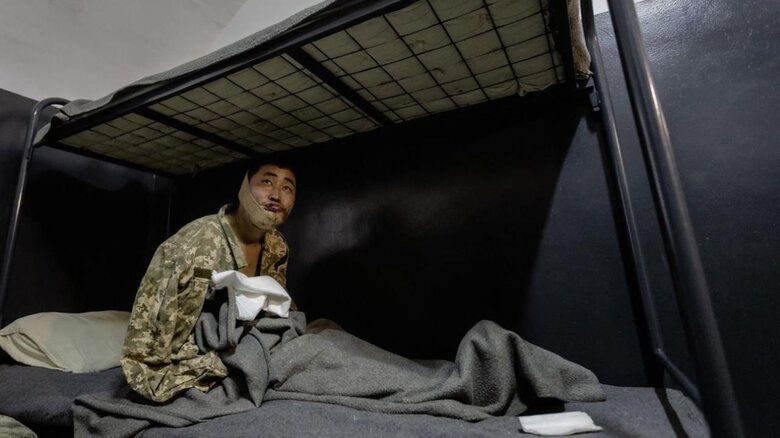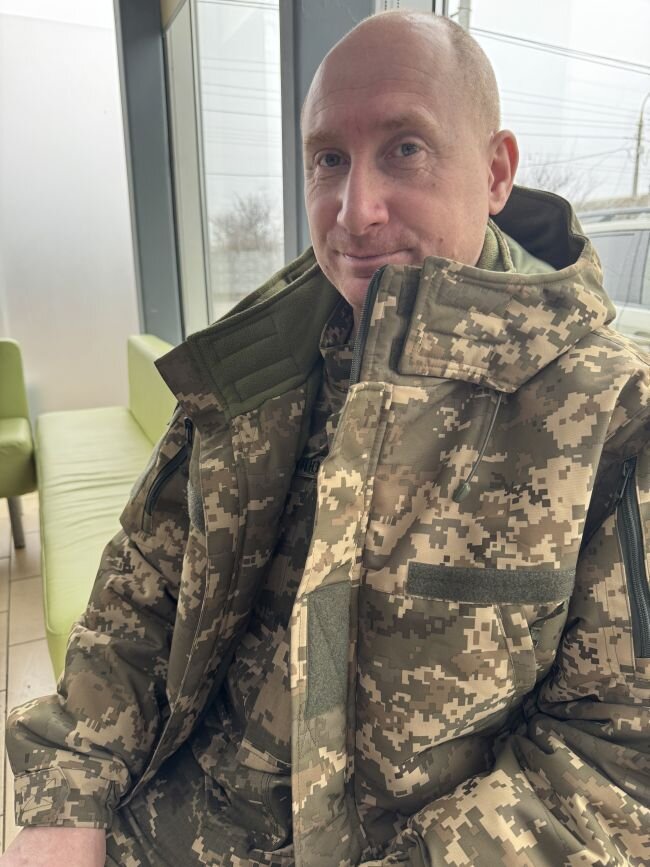Paratrooper from 95th Brigade, Serhii, call sign Sirko: "When wounded DPRK soldier realized he had been captured, he slammed his head... into pole with all his strength"
A 44-year-old man from the Ternopil region, who joined the army in July 2024, was awarded the Order of Courage, along with two of his comrades-in-arms, for capturing a live North Korean soldier—proof that a third country’s military is involved in the war against Ukraine.
The phrase "Ukrainian paratroopers captured a serviceman of the North Korean army fighting on the side of the Russian Federation in the Kursk region" sounds unbelievable in every sense. Yet, this is the reality of our time. It was crucial to prove this fact—that personnel from a third country had entered in the war against Ukraine. The world needed not only the documents of dead North Korean soldiers but also living POWs who could provide testimony.
North Korean troops entered combat in October. However, for over a month, our forces were unable to capture any of them, despite the fact that they launched assaults in large groups—30, 50, or even 70 men at a time. They meticulously evacuated not only their wounded but also their dead, unlike the Russians, who have abandoned their own from the very first days of the full-scale invasion. Only weeks later did Special Operations Forces (SOF) manage to recover the bodies of North Koreans—along with their documents and notebooks. Once translated, these materials revealed the extent of their indoctrination. They go into battle believing that surrender is never an option—it is better to detonate themselves or take their own lives. Moreover, our soldiers have witnessed cases where captured North Koreans, upon realizing they had been taken prisoner, bit through their own veins. Their commanders' orders make it clear: death is preferable to capture.
Only in January of this year did two separate units finally manage to take North Korean soldiers prisoner. One was captured by special operations forces, while the other was taken prisoner by troops of the 95th Air Assault Brigade.
Perhaps it was a coincidence, but almost immediately after the capture of two DPRK servicemen, these troops were withdrawn from the front line. They are no longer engaged in combat. Most likely, they are regrouping after suffering significant losses and reassessing their tactics based on battlefield experience. However, our seasoned fighters—who have been defending Ukraine since 2014 and have encountered enemies of various levels of training—say this: "It seemed that the Wagners were the toughest. They fought to the last. But the North Koreans... They are even tougher, more resilient, and completely unafraid of death."
"THE DRONE OPERATORS SPOTTED THAT SOMEBODY WAS MOVING. OUR TROOPS APPROACHED AND ADDRESSED HIM IN UKRAINIAN, RUSSIAN, AND ENGLISH. HE DIDN’T UNDERSTAND A SINGLE WORD."
Serhii is 44 years old. When the full-scale invasion began, he returned from his job in Germany and joined the Territorial Defense Forces. His draft notice arrived last summer—on July 30. After completing training, he was assigned to the 95th Air Assault Brigade, a unit with an extensive combat history. On the day the battle took place and the North Korean soldier was captured, DPRK troops attacked that direction for the first time—right where Serhii and his comrades were stationed.
- "My comrade Balu and I were in a concealed position that the enemy was unaware of," Serhii recalls. "At around six in the morning, we received a radio transmission warning of a possible enemy movement. We remained on high alert. And sure enough, the enemy advanced in our direction. They were eliminated by drones. But about five of them managed to reach our position."
- Did you know it was the Koreans advancing?
- No. It didn’t matter to us who they were. If enemy forces were advancing, our job was to stop them. We let them get closer. Luckily, they had no idea we were there. We injured them immediately. They stopped a bit further from us. A small arms engagement ensued. Our drones provided support. The pilots were correcting our fire, watching from above, and relaying intel on enemy movements. They kept trying to push forward, but they couldn’t break through. Our mortar team was also hitting them.
We fought them until about 3 PM. They had no idea how many of us there were because we did not shout to one another. We were only ten meters apart, communicating via radio. The enemy was tough—die-hard and highly trained.
- What makes you say that?
- The amount of payload drops dropped on a single target was insane… And even when wounded, their soldiers kept fighting. They would crawl away, come back… but they never stopped.
Then our support unit arrived. That’s when the enemy realized they had no chance of advancing any further. They began to withdraw, taking with them whatever they could. We kept pressing them. But the command ordered us to hold position and not pursue. So we stayed put.
My friend Balu was wounded that day—an "officer’s wound" in the buttock. I was also hit in the leg by a drone payload. But when I checked myself, I couldn’t find a hole in my trousers, so I didn’t pay much attention. Later, I realized that the fragment had entered from the left side, pierced my left trouser leg, and lodged in the soft tissue of my right leg. Only on the second day after the battle did I find out that I was a light WIA (wounded in action). After the fight, my comrade was evacuated. That marked the end of the battle.
As it turned out, this guy—this North Korean—took a wrong turn and ended up on the wrong side of the forest plantation. His jaw was broken, and his right arm was bandaged. Most likely, someone had treated him during the battle—he wouldn’t have been able to bandage himself up like that on his own.
Our drone operators spotted that somebody was moving. He was wearing a balaclava, so we couldn’t immediately tell who he was—he could have been a lost soldier from a neighboring unit. The guys stepped out of cover and approached him, asking in Ukrainian, "Friend, do you need help?" He didn’t respond. It was already evening, visibility was poor. They asked again in Russian. Then in English. Nothing. When they got closer, they saw he was definitely not one of ours. He had grenades and a knife on him. We showed him what to do with gestures. Although he didn't really understand the gestures. A grenade and everything else was seized from him. He probably didn’t realize he was facing Ukrainians—none of us had insignia, and we weren’t wearing pixel camouflage but Multicam...So he calmly handed over the grenade and the knife. He had no other weapons. He was small, wearing two jackets and an oversized plate carrier. His gear was subpar.
- Did he not resist?
- No. They took him down into a trench and gave him a cigarette. He seemed fairly calm. It was only when the extraction team arrived that he noticed a triangle on the vehicle. Apparently, then he realized something. He rushed headfirst into a pole at full speed. He hit it and collapsed. But it looked staged.
"WHEN YOU'RE TOLD TO DIG, IT DOESN'T MEAN THEY WANT TO GIVE YOU EXTRA WORK. THE SOONER YOU DIG A SHELTER, THE BETTER YOUR CHANCES OF SURVIVAL."
- Were you given prior orders that capturing the North Korean was a priority?
- Let’s just say we didn’t have that intel at the time. We were carrying out our mission. If there was an opportunity to take prisoners, we took them. If not, then not.
At the moment, we are holding our positions. If they attack, we repel them. There had been reports of North Koreans operating in the area, but this was the first time they had moved in our direction. The important thing is that we made it out alive. Slightly wounded, but alive.
- When were you told you would receive the awards?
- No one told us there would be any bonuses for capturing such a prisoner. We weren’t concerned with rewards. The main thing was to stay alive. War teaches fast. In close-quarters combat, it's either you or the enemy. On the second day after the battle, they asked if I was fit for duty. "Yes," I answered, "I can continue with my tasks." But they sent in a replacement so I could be seen by a doctor. I received orders to pack my things and be ready. You don’t ask questions. You follow orders.
I found out I was being awarded the Order for Courage, III degree, only at the ceremony in Kyiv. Of course, it was an honor to receive a combat decoration, but it’s not about the medals. For me, it’s just a job that has to be done. Awards are nice, but the best reward is making it out alive—out of that battle, off those positions. Maybe someday, on a holiday, on Air Assault Forces Day, I’ll wear my medals. But the most important thing is to live to see that day.
- Did you not fight until 2022?
- I worked abroad for a very long time in a logistics service for international transport. When the full-scale offensive began, I could not stand it morally and returned home.
I believe that war is not a civilian's duty. There is an army and trained people for that. In 2014, there was no clear message from the state that everyone needed to take up arms in defense. A very small percentage of people back then understood that it was a war. I thought the same thing – it had nothing to do with me. I worked abroad legally, and my family could visit me. But a foreign country is still a foreign country. I asked: will you come to me? My wife said no. So, as soon as everything started, I came back by myself. Before I received my draft notice, I was already training with the guys. I'm 45 years old. I know all my sore places. I know what I can do and what I no longer have the strength for.
To be honest, I don’t understand when people are afraid of a draft notice and say it's a one-way ticket. A draft notice is a two-way ticket. It's 50-50. You can either return home or die. But it depends on you. If you understand your situation and follow every order, your chances of survival increase significantly. When they tell you to dig, it doesn’t mean they’re trying to give you extra work. The sooner you dig a shelter, the better your chances of survival.
Back when there were no drones, the guys say, you could sit just a hundred meters away from the enemy. We even shouted at each other. But there was no way to reach the enemy. Now drones see you both day and night. The main thing now is to avoid detection. And dig. If you have the chance, dig. When you first see that exactly that trench has saved your life, you realize how important it is. The first time something hits out of nowhere and buries the trench, you have to dig it out. But if the trench is gone, so are you. This realization hits you on the very first day in combat. The first thing we were told in the 95th Brigade was that we had to dig. And I quickly saw how effective it was.
Violetta Kirtoka, Censor. NET





